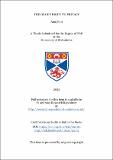Files in this item
The group right to privacy
Item metadata
| dc.contributor.advisor | Ball, Kirstie | |
| dc.contributor.advisor | Cruft, Rowan | |
| dc.contributor.advisor | Hawley, Katherine (Katherine Jane) | |
| dc.contributor.author | Puri, Anuj | |
| dc.coverage.spatial | 253 p. | en_US |
| dc.date.accessioned | 2022-04-07T13:01:04Z | |
| dc.date.available | 2022-04-07T13:01:04Z | |
| dc.date.issued | 2022-06-13 | |
| dc.identifier.uri | https://hdl.handle.net/10023/25152 | |
| dc.description.abstract | In the age of Big Data Analytics and Covid-19 Apps, the conventional conception of privacy that focuses excessively on the identification of the individual is inadequate to safeguard an individual’s identity and autonomy, when she is targeted on the basis of her interdependent social and algorithmic group affiliations. In order to overcome these limitations, this interdisciplinary research develops a theoretical framework of the group right to privacy (GRP), which is based on privacy as a social value (Pᵥ). The quadrumvirate formulation of GRP is articulated on the dual lines of the individual’s right as a member of a group and the right of the group itself. An individual’s interest in her social identity and her socially embedded autonomous self is protected through GRP₁. The individual’s right against algorithmic grouping, GRP₂, is motivated by an interest in group-related aspects of informational self-determination. Thirdly, I provide a non-reductionist account of instances where some organized groups may be entitled to privacy in their own right as GRP₃. Lastly, I articulate the collective interest in Mutual Privacy, understood as an aggregate participatory shared public good which is protected through GRP₄. In all four GRP, I carve out a limited exception for contact tracing by Covid-19 Apps during the extraordinary circumstances of the pandemic while safeguarding against the creation of a new normal of erosion of privacy and the rise of post-pandemic simveillance. To test its efficacy, this theoretical model is critically analysed against the technological challenges posed by Big Data Analytics and Covid-19 Apps. I further examine international privacy legislations to highlight the way this expansive privacy model can be incorporated in the regulatory landscape. In conclusion, this thesis emphasizes that our privacy is not only interdependent in nature, but also existentially cumulatively interlinked and should be protected through the GRP. | en_US |
| dc.description.sponsorship | "This work was supported by the St Leonard’s College Interdisciplinary Doctoral Scholarship, which was jointly funded by the University of St Andrews, the School of Management and the School of Philosophical, Anthropological & Film Studies" -- Funding | en |
| dc.language.iso | en | en_US |
| dc.publisher | University of St Andrews | |
| dc.subject | The group right to privacy | en_US |
| dc.subject | Big data | en_US |
| dc.subject | Group right | en_US |
| dc.subject | Privacy | en_US |
| dc.subject | Big data analytics | en_US |
| dc.subject | Autonomy | en_US |
| dc.subject | Identity | en_US |
| dc.subject | Social identity | en_US |
| dc.subject | Surveillance | en_US |
| dc.subject | Social value | en_US |
| dc.subject | Group privacy | en_US |
| dc.subject.lcc | JC596.P8 | |
| dc.subject.lcsh | Privacy, Right of | en |
| dc.subject.lcsh | Privacy--Moral and ethical aspects | en |
| dc.title | The group right to privacy | en_US |
| dc.type | Thesis | en_US |
| dc.contributor.sponsor | University of St Andrews. St Leonard's College Interdisciplinary Doctoral Scholarship | en_US |
| dc.type.qualificationlevel | Doctoral | en_US |
| dc.type.qualificationname | PhD Doctor of Philosophy | en_US |
| dc.publisher.institution | The University of St Andrews | en_US |
| dc.identifier.doi | https://doi.org/10.17630/sta/161 |
This item appears in the following Collection(s)
Items in the St Andrews Research Repository are protected by copyright, with all rights reserved, unless otherwise indicated.

